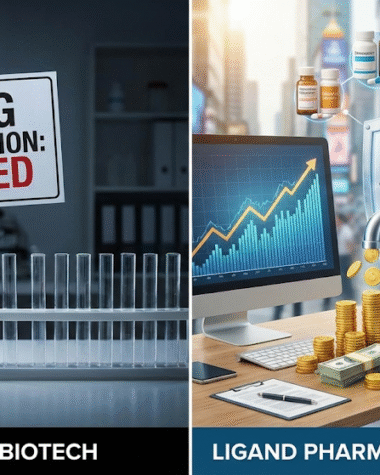Metsera Inc. (NASDAQ:MTSR) is a clinical-stage biopharmaceutical company founded in 2022 with a focus on developing next-generation therapies for obesity and metabolic diseases. Headquartered in the United States, the company has quickly become one of the most closely watched players in the weight-loss drug sector, leveraging its novel nutrient-stimulated hormone (NuSH) platform to design differentiated treatments that aim to improve efficacy, safety, and patient convenience. With backing from top-tier global investors including ARCH Venture Partners, SoftBank, Mubadala, GV, and F-Prime, Metsera raised nearly $290 million in early funding, giving it the resources to advance multiple programs through clinical development.
The company’s lead candidate, MET-233i, is a long-acting amylin analogue designed for obesity treatment. Early-stage clinical results demonstrated promising weight-loss efficacy, with patients losing up to 8.4% of body weight in just 36 days. Unlike existing GLP-1 treatments from competitors such as Novo Nordisk and Eli Lilly, which require weekly dosing and are associated with gastrointestinal side effects, Metsera’s approach offers the potential for monthly injections with a gentler tolerability profile. This differentiation in both convenience and safety could allow Metsera to carve out a strong competitive position in the fast-growing global obesity drug market, which is projected to surpass $100 billion in annual sales within the next decade.
Beyond its lead program, Metsera is building a pipeline of innovative therapies that include both injectable and oral formulations, aiming to address unmet needs in weight management and metabolic health. By focusing on mechanisms beyond GLP-1 and targeting long-term compliance, the company is seeking to develop treatments that are not only effective but also more accessible and sustainable for patients worldwide. With strong clinical data, strategic investor support, and growing recognition from major pharmaceutical companies, Metsera has established itself as a potential leader in the next wave of obesity treatments and a key player in the broader biopharma landscape.
Pfizer’s $7.3 Billion Bid Validates Metsera’s Strategic Value
The news that Pfizer Inc. is preparing a $7.3 billion acquisition of Metsera Inc. is one of the strongest bullish signals possible for this young biotech. According to the Financial Times, Pfizer is expected to pay $47.50 in cash per share and offer an additional $22.50 per share in milestone payments, representing a significant premium over Metsera’s recent close of just above $33 in New York. For investors, this represents not only a substantial near-term valuation uplift but also validates Metsera’s technology pipeline at the highest level. When a global pharmaceutical giant, under pressure to rebuild its growth drivers after its obesity pill setback, turns to Metsera, it demonstrates the strategic importance of its portfolio and its differentiation within the highly competitive obesity market.

CHECK THIS OUT: Saudi Arabia Wants CEL-SCI (CVM)’s Multikine Now! and Aligos Therapeutics (ALGS) Doubles Cash to $122.9M.
A Unique Opportunity in the Obesity Drug Market
The global obesity drug market is projected to be worth well over $100 billion annually within the next decade, driven by increasing prevalence of obesity, government health initiatives, and shifting patient preferences toward pharmaceutical solutions. Companies like Novo Nordisk and Eli Lilly dominate today’s GLP-1 market, but new modalities are already in demand due to tolerability concerns and the burden of weekly injections. Metsera has positioned itself in this next wave with MET-233i, a long-acting amylin analogue that has shown up to 8.4% weight loss in just 36 days in an early-stage trial. This rapid and meaningful efficacy makes it highly competitive in the short term, while the potential for once-monthly dosing sets it apart in the long term. The convenience factor could significantly improve patient compliance, broadening the addressable market and creating strong commercial potential.
Differentiation Through Amylin Analogues
What makes Metsera’s approach particularly compelling is its focus on amylin analogues rather than GLP-1s alone. Amylin is considered a gentler option, with potentially fewer gastrointestinal side effects compared to traditional GLP-1 therapies. This creates a differentiated safety and tolerability profile that could give Metsera an edge in markets where patient adherence has been a challenge. Bloomberg Intelligence analyst Michael Shah noted in September that MET-233i could have best-in-class potential in obesity, particularly because of its long half-life enabling once-monthly dosing. If these characteristics are confirmed in larger trials, Metsera’s treatment could become a preferred choice among patients and physicians, putting it on a competitive footing even against industry titans.
Why Pfizer’s Interest Matters Beyond the Premium
Pfizer’s intent to acquire Metsera is more than just a financial transaction. It highlights how urgently big pharma is seeking credible obesity assets to diversify revenue streams and counter patent losses. Pfizer has faced declining demand for its Covid-19 vaccines and treatments, while patent expirations are expected to cut more than $15 billion in sales by 2030. The acquisition of Metsera is part of a broader plan by Pfizer to deploy $15 billion across two or three deals in 2025, aimed squarely at rebuilding its pipeline. For Metsera, being at the center of that strategy provides both financial backing and global commercial expertise to accelerate development, scale manufacturing, and secure regulatory approvals faster than it could independently.
Long-Term Upside Beyond the Acquisition
Even if Pfizer completes the acquisition, the bullish case for Metsera’s core technology does not end at the buyout premium. Integration into Pfizer’s global infrastructure could supercharge the rollout of MET-233i and any other pipeline assets. With Pfizer’s scale in clinical development, regulatory negotiations, and commercial distribution, Metsera’s drug candidates could move through trials and approvals far more efficiently, accelerating time to market. For investors, this means that Metsera’s science and data are not only validated but also gain access to the capital and resources needed to compete with Novo Nordisk and Eli Lilly in a space projected to transform the future of healthcare.
Conclusion: A Transformational Moment for Metsera
The potential Pfizer acquisition of Metsera underscores a powerful bullish thesis: a small clinical-stage company with breakthrough science has attracted one of the world’s largest pharmaceutical companies, eager to buy its way back into obesity leadership. With MET-233i showing strong early efficacy, the promise of monthly dosing, and a differentiated safety profile, Metsera’s platform addresses some of the most pressing needs in obesity care. Combined with the validation and premium attached to Pfizer’s bid, Metsera stands as one of the most compelling emerging stories in biotech today, offering both near-term valuation upside and long-term strategic importance in one of the fastest-growing therapeutic markets in the world.
READ ALSO: Exact Sciences (EXAS) Just Made Cancer Detection 100x Easier! and Soleno Therapeutics (SLNO): The Biotech Company That Could Make You Rich.








